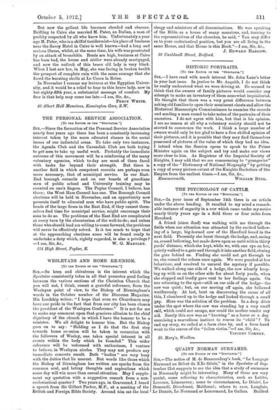WESLEYANS AND HOME RE-UNION.
[To THE EDIT= OF THE "SPECTATOR."] Sin,—So keen and chivalrous is the interest which the Spectator consistently takes in all that promotes good feeling between the various sections of the Christian Church that you will not, I think, resent a. grateful reference, from the Wesleyan point of view, to the Bishop of Birmingham's words in the October number of the Diocesan Magazine. His Lordship writes : " I hope that even we Churchmen may have our pride in the fact that from our city has been chosen the president of the Wesleyan Conference." It is not for me to make any comment upon that gracious allusion to the chief dignitary of the church in which I have the honour to be a minister. We all delight to honour him. But the Bishop goes on to say : "Holding as I do that the first step towards home re-union will be taken in connexion with the followers of Wesley, one takes special interest in all events within the body which he founded." This wider reference will be welcomed with enthusiasm, I venture to believe, in Wesleyan circles. They may not produce any immediate concrete result. Both " bodies " are- very busy with the duties that lie nearest. But words like those which the Bishop of Birmingham has written are sparks from the common soul, and betray thoughts and aspirations which some day will win more than casual attention. May I supple- ment ray quotation with a suggestive remark from a non- ecclesiastical quarter P Two years ago, in Gravesend, I heard a speech from Sir Gilbert Parker, M.P., at a meeting of the British and Foreign Bible Society. Around him eat the local
clergy and ministers of all denominations. He was speaking of the Bible as a house of many mansions, and, turning to the representatives of the churches, he said, " You may differ as to your ecclesiastical position, but you are all living in the same House, and that House is this Book."—I am, Sir, &c., 30 Cauldtvell Street, Bedford. J. ED WARD HARLOW.


































































 Previous page
Previous page